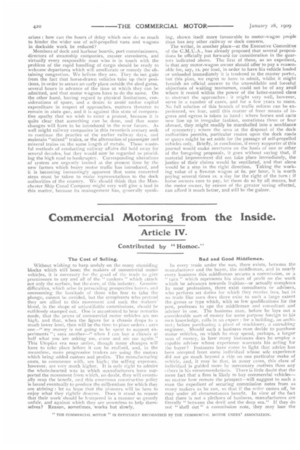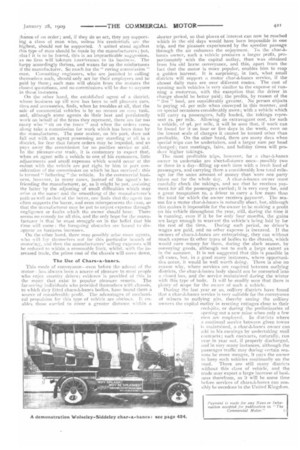Commercial Motoring from the Inside.
Page 2

Page 3

If you've noticed an error in this article please click here to report it so we can fix it.
Article IV.
Contributed by " Homoc."
The Cost of Selling.
Without wishing to harp unduly on the many stumbling blocks which still beset the makers of commercial motor vehicles, it is necessary for the good of the trade to give prominence to any and all of the " cankers " which attack not only the surface, but the core, of this industry. Genuine difficulties, which arise in persuading prospective buyers and overcoming the lassitude of those who fear to take the plunge, cannot be avoided, but the sycophants who pretend they are allied to this movement and suck the makers' blood, in the shape of unjustifiable commissions, should be ruthlessly stamped out. One is accustomed to hear remarks made, that the prices of commercial motor vehicles are too high, and that, when the figure for a chassis drops to a much lower level, then will be the time to place orders : says one—" my money is not going to be spent to support experiments "; says another—" when I can buy a chassis at half what you are asking me, come and see inc again." This Utopian era may arrive, though many changes will have to take place before it can be realised, and, in the meantime, more progressive traders are usin.g the motors which bring added custom and profits. The manufacturing costs, to commence with, are high; the selling expenses, however, are very much higher. It is only right to admire the whole-hearted way in which manufacturers have supported the movement from which, no doubt, they will eventually reap the benefit, and this enormous constructive policy is bound eventually to produce the millennium for which they are striving : let us hope that the pioneers will be here to enjoy what they rightly deserve. Does it stand to reason that their work should be hainpered in a manner so grossly unfair, and against which they are powerless to help themselves? Reason, sometimes, works but slowly. Bad and Good Middlemen.
In every trade under the sun, there exists, between the manufactarer and the buyer, the middleman, and in nearly every business this middleman secures a commission, or a " turn " which represents his share of profit on the work which he advances towards fruition—or actually completes ln most professions, there exist consultants or advisers, who perform set duties for which they receive fees, but in no trade like ours does there exist to such a large extent the genus or type which, with so few qualifications for the post, professes to ape the middleman and consultant and adviser in one. The business man, before he lays out a considerable sum of money for some purpose foreign to his own knowledge, calls in an expert : for a building, an architect; before purchasing a plant of machinery, a consulting engineer. Should such a business man decide to purchase motor vehicles, on which he may spend, perhaps, a larger sum of money, in how many instances does he employ a capable adviser whose experience warrants his acting for the buyer? Instances have come to light that advice has been accepted from some individual whose sole experience did not go much beyond a ride on one particular make of vehicle, and, it may be that, in many cases, this class of individual is guided more by mercenary motives than any (-Alters in his recommendations. There is little doubt that the mere fact that a firm is likely to buy commercial vehicles— no matter how remote the prospect—will suggest to such a man the expedient of securing commission notes from as many makers as he can, so that if the order comes off, he may under all circumstances benefit. In view of the fact that there is not a plethora of business, manufacturers are literally " between the devil and the deep sea." If they do not "shell but" a commission note, they may lose the
:lance of an order ; and, if they do so act, they are supporting a class of man who, unless his credentiaG are the highest, should not be supported. A united stand agarnst this type of manshould be made by the manufacturers; but, alas I it is to be feared, this is an impracticable suggestion, as no firm will 'tolerate interference in its .business. "l'he harpy accordingly thrives, and waxes fat on the misfortunes af the manufacturer. So much for the " roving commission " man. Consulting, engineers, who are justified in calling themselves such, should only act for their employers and be paid by them ; such men will obtain from the makers the cloSest quotations, and no commissions will be (Inc to anyone in these instances, On the other hand, the established agent of a tlistrict, whose business up till now has been to sell pleasure cars, tires and accessories, finds, when he troubles at all, that the sale of commercial vehicles is by no means an eas.y task, and, although some agents do their best and persistently work on behalf of the firms they represent, there are far too many who " sit on the fence " and when the orders come along take a commission for work which has been done by the manufacturer. The poor maker, on his part, dare not fall out with an agent possessing any standing at all in a district, for fear that future orders may be impeded, and so pays away the commission for no positive service or aid. In the pleasure-car trade, it is customary to expect that, when an agent sells a vehicle to one of his customers, little adjustments and small expenses which would occur at the outset with the vehicle are put right by him in part consideration of the commission on which he has received : this is termed " fathering " the vehicle. In the commercial business, however, in many cases, instead of the agent's befriending the manufacturer, or, as it might be put, assistingthe latter by the adjusting of small difficulties which may arise at. the outset and the smoothing of the manufacterer's path as well as that of the buyer, one finds that the, agent too often supports the buyer, and even misrepresents the case, so that the manufacturer may be put to unjust expense through negligence or faults which the owner should bear. There seems no remedy for all ihis, and the only hope for the manufacturer is that he must struggle on in the belief that his time will come : the foregoing obstacles are bound In disappear as business increases.
On the other band, there may possibly arise more agents, who vill lny themselves out for this particular branch of motoring. and then the manufacturers' selling expenses will he reduced to within a reasonable limit, whilst, with the increased trade, the prime cost of the chassis will come down.
The Use of Chars-a-bancs.
This mode of conveyance—even before the advent of the motor— has ;ilwavs been a source of pleasure to most people who enjoy country drives; evidence is provided of this in the many that exist in popular pleasure resorts, The far-seeing individuals who provided themselves with chassis, to which they fitted chars-à-ban-es bodies, have found them a source of considerable profit. The advantages of mechanical propulsion for this type of vehicle are obvious. It enables those carried to cover a greater distance within a
shorter period, so that places of interest can now be reached which in the old days would have been impossible in one trip, and the pleasure experienced by the speedier passage through the air enhances the enjoyment. To the char-abanes owner, such a vehicle produces a larger profit, proportionately with the capital outlay, than was obtained from his old horse conveyance, and this, apart fromn the fact that the motor is more popular, enables him to reap a golden harvest. It is surprising, in fact, what small districts will support a motor char-asbancs service, if the almost daily runs are over different routes. The cost of running such vehicles is very similar to the expense of running a motorvan, with the exception that the driver in charge should be better paid; the profits, by reason of the "live " load, are considerably greater. No person objects to paying id. per mile when conveyed in this manner, and on special occasions considerably more; with a vehicle which will carry 24 passengers, fully loaded, the takings represent 2$. per mile. Allowing an extravagant cost, for such a vehicle, of od. per mile, it will be seen that, if work can be found for it on four or five days in the week, even on the lowest scale of charges it cannot be termed other than profitable. On the other hand, there are many days when special trips can be undertaken, and a larger sum per head charged; race meetings, fairs, and holiday times will produce higher takings.
The most profitable trips, however, for a char-a-bancs owner to undertake are short-distance ones—possibly two or three in a day—filling up each time with a fresh load of passengers, and carrying them a considerably less total mileage for the same amount of money than were one party taken out for the whole day. A chara)sbancs owner must carefully check the takings, and see that he receives payment for all the passengers carried; it is very easy for, and a great temptation to, a driver to carry a few more than the total for which the owner receives payment. The season for a motor char-a-bancs is naturally short, but, although this makes it impossible for the owner to be making a profit on his vehicle throughout the year, still, during the time it is running, even if it be for only four months, the gains are large enough to warrant the vehicle's being laid by for
the rest of the time. During such period, no driver's wages are paid, and no other expense is incurred. If the owners of chars-a-bancs are enterprising, they can without much expense fit other types of bodies to the chassis, which would earn money for them, during the slack season, by conveying goods, although not • to such a large extent as in the summer. It is not suggested that this is possible in all cases, but, in a good many instances, where opportunities occur, it would be well worth doing. There is also no reason why, where services are required between outlying districts, the char-a-hancs hotly should not be converted into a closed bus, and the service maintained during the winter with this type of body. It will be readily seen that there is plenty of scope for the owner of such a vehicle.
During the last year or so, colliery districts have found that a char-A-bancs service is very suitable for the conveyance of miners to outlying pits, thereby saving the colliery owners the capital outlay in erecting cottages close to their coal-pits, or during the preliminaries of opening out a new mine when only a few men are employed. In districts where a continual service between given towns is maintained, a char-a-lance owner can add to his earnings by undertaking mall contracts ; such contracts, naturally, run year in year out, if properly discharged, and in very many instances, although the passenger traffic may during certain sea sons be more meagre, it pays the owner to keep such vehicles continually on the road. There are still many districts without this class of vehicle, and the trade may expect a large increase of business therefrom, as it will be some time before services of chars-h-hancs can possibly be overdone in the United Kingdom.




















